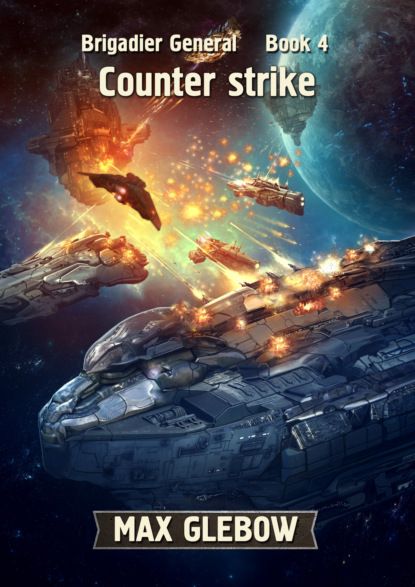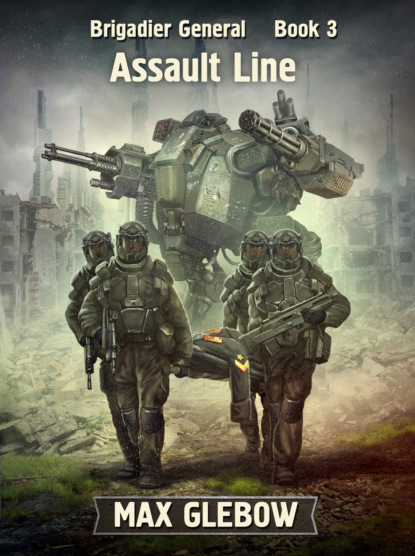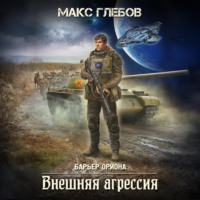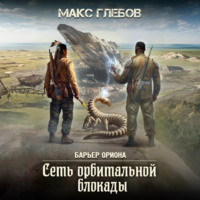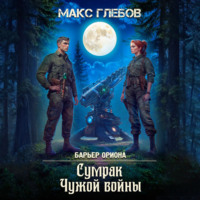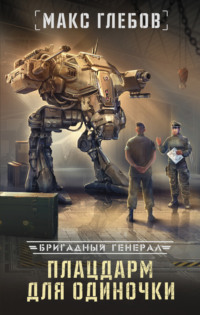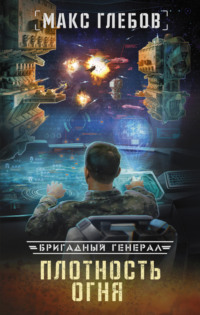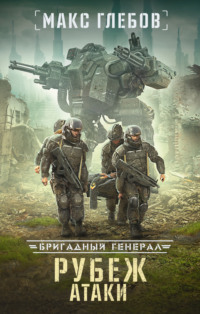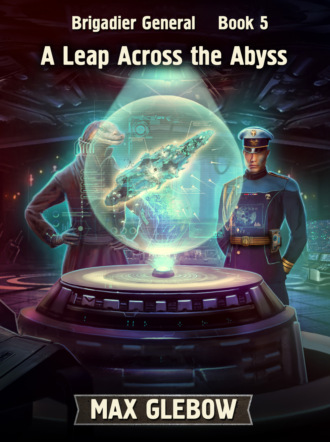
Полная версия
A Leap Across the Abyss

Max Glebow
Brigadier General. A Leap Across the Abyss
Prologue
This time our arrival at Groombridge took place without undue haste. Dragon’s Tail has left the portal without any interference in one jump from the planetary system. The flagship of the strike fleet was one of the last to arrive here, and I have got the opportunity to look again at the great forces gathered here to finally retake the planets captured by the quargs.
Five Titans, which already very faintly resembled the first captured battleship that received this name during the battle for the Barnard’s Star system, 10 aircraft carriers and 30 standard battleships built at Earth Federation yards, 25 dreadnoughts allocated for this operation by the lizards, cruisers, destroyers, corvettes, recon ships, 50 «Invisibles» and battleship New World – a quarg ship captured by us in the Kappa Ceti system, with a crew composed entirely of our former mortal enemies who have undergone the mental block removal procedure and expressed the desire to participate in the liberation of their compatriots from the control of the toads.
Imperial ships were not involved in the operation. A very impressive squadron from Brigadier General Dean’s world remained our bargaining chip, it was now based in the Solar System under the cover of powerful camouflage fields and a dense reconnaissance and patrol network, which prevented it from being detected by the enemy. But even without it, a formidable fleet has gathered here, and I had no doubt that the Groombridge Defence Force would have nothing to counteract our strike. But we weren’t going to turn into dust everything we’d encounter on and around the occupied planets. On the contrary, the main task for us was a bloodless conquest of planets, if possible, and, above all, the quargs themselves.
The Federation’s policies have changed dramatically. The vast majority of the quargs, while still fighting against humans and lizards, were no longer considered to be the initiators and perpetrators of this long war, and, consequently, their deaths during the operation were not only not intended but were considered highly undesirable.
Here we wanted to test new tactics aimed at capturing a large number of quargs and then freeing them from the mental block. The Imperial admirals did not fully share our desire to help the enemy, who continued to actively fight us. In their view, it was necessary to act swiftly and decisively, but President Tobolsky and the Senior Lizard supported my plan and showed unexpected firmness in the matter, so the new allies decided not to exacerbate the situation, all the more so that in the operation they were only supposed to help us in case the ships of the toads appeared at Groombridge.
“Commander, Sir, transports of the 15th and 35th Commando Corps have arrived. Thirty minutes from now, the fleet will be ready to accelerate and jump into the system,” reported Chief of Staff Admiral Fulton, the same James Fulton who provided a guarantee for me in the court during the financial conspiracy and whose son I had kind of a disagreement with five years ago at the Planetary Commando Academy, and then fought shoulder to shoulder on Luyten-5. I must say, I was glad that fate brought us back together.
“Any new intel from the recon guys?”
“It’s still the same. The quargs do not yet know of the concentration of our fleet in one jump from the system. Their cover squadron is concentrated at Groombridge-2. There’s a standard patrol network. Our fleet will be discovered within minutes of emergence out of jump.”
“Judging by previous operations, we’ll have at least 24 hours before aid arrives to the enemy, if it ever arrives,” the commander of Dragon’s Tail lizard Slin-at has joined the discussion, “Our firepower is ten times that of their cover squadron. If it comes to a fight, we’ll crush them in a few hours. And even if help comes to them, the system will have already been under our complete control.”
“We may need more time than for a standard assault,” I didn’t go into the details of the plan. The Chief of Staff knew the plan, and Slin-at was only a commander of a battleship, even if it was the flagship of the fleet, so he didn’t need the details. “Fleet, start acceleration when ready.”
On the tactical projection, I saw the transport ring split into 12 segments, which turned on the engines and took places at the end of the formation of the ships that were preparing to proceed in synchronized acceleration. They were supposed to be the last to jump, so that by the time they arrived in the attacked system, the exit zone would have been secured by the main force of the fleet.
“Fleet Admiral, Sir,” I was approached by Imperial General Clay, present on the flagship as an observer for our new allies, “Among your ships is a battleship that is entirely under the control of the quargs. There are no men or lizards in it’s crew. I understand it’s a gesture of trust in former enemies. But they did fight against you very recently, even if they didn’t do it quite willingly. You’re not afraid of being stabbed in the back?”
I’ve known Clay so long, I won’t even remember when I first saw him. The General was one of the few people in the Empire and the Federation who knew who I was. After all, it was Clay and Dr Silk who planned the operation to send Brigadier General Dean’s consciousness through the abyss of space into my present body. I am so grateful to them for that, I’ll never forget it. In that world, I was Clay’s subordinate for so many years, I couldn’t get used to the fact that we are now in equal ranks, and besides we serve in the armed forces of different States, even if allied.
“Well, if our security officers didn’t object, then we have no reason to doubt their loyalty,” I smiled at Clay. “More seriously, of course, there are doubts. No, I’m not afraid of direct betrayal, but I highly doubt they’ll follow any orders. But I’m not gonna make them bomb cities with civilians… That’s an order I won’t even give to my own people, let alone the quargs.”
“As far as the peaceful cities are concerned, that’s understood,” Clay still had his doubts, “but will they be able to engage a battleship similar to their own and kill their former comrades in cold blood?”
“That’s the right question, General, Sir,” I nodded to him, “Of course, I’ve asked myself that many times, and I finally found the answer. On board New World there are no lethal weapons, but it has not become a less serious combat force because of this.”
“But…” Clay was clearly embarrassed by my answer.
“You’ll see for yourself, General, Sir,” I smiled again, “Now, if you’ll excuse me, I have to get back to fleet command, we’re about to start acceleration for the jump.”
Chapter 1
After our attack on Kappa Ceti and the release of the prisoners, the General Staff was most fearful of an immediate crushing strike by a new, formidable enemy. The crew of the toads’ cruiser we took captive claimed in one voice that this was likely to be the case, and this view was very well aligned with my ideas on how our adversary should proceed. But time passed, and the attack never happened, and the generals and admirals of the Federation, feverishly preparing for a hopeless battle, were wondering what was going on.
Rear Admiral Yoon Gao has kept all Fleet intelligence on their toes, but it turned out to be impossible to get close enough to the toads’ systems to know what was going on using our equipment. Even custom-made, manually tuned unmanned probes equipped with near-radiationless lizard-made engines and the best scanners and camouflage devices manufactured by Jeff’s department, have been hit by the enemy far beyond planetary systems. Under these circumstances, Yoon Gao found it impossible to send manned ships to the mission.
At least we knew from the prisoners which stars had the enemy’s densely populated planets, but that was all we knew. But in the quarg space our scouts felt more free. I didn’t like what was going on there. It was clear that the quargs were feverishly working to recreate their fleet, which we had defeated and partially captured at the battle of star Ran. On the other hand, we understood that an immediate strike by the enemy was unlikely, and the Federation had time to negotiate with the Empire, where I went almost immediately. And a few days after I left, there was a meeting at the General Staff, which Nelson later told me about.
“Why didn’t they strike at once, flag officers, Sirs? Do you have a logical explanation?” asked President Tobolsky.
“Mr President,” General of the Army Knyazev has taken the floor, “analysts are considering several leads, but we believe the enemy’s lack of information about our forces and capabilities is the most likely cause.”
“Explain your point, Pavel Grigorievich,” the President was obviously interested in this hypothesis.
“Immediately after capturing an enemy cruiser in the Kappa Ceti system, Admiral Lavroff, with the help of the lizards of Governor-General Lit-ta, conducted an express interrogation of its captain. At the very end of the interrogation, the toad asked permission to ask the Admiral a question, and Igor Yakovlevich did not object. Well, the captain of the captured cruiser was wondering where we got the transport ring technology from. In his view, it was a technique that was far ahead of our technological level, and we couldn’t develop it without outside help.”
In this place of the story Tobolsky laughed at his thoughts, and Knyazev fell silent, not knowing how to react to the President’s facial expressions.
“Continue, Pavel Grigorievich, I’m listening to you very carefully.”
“From the information received from the prisoner, it appears that the toads also possess the technology of the transport ring, but they are only able to use the equipment made by their ancestors. The two toads’ ships managed to leave the Kappa Ceti system unhindered and inform their leadership of the details and results of the battle, that is to say, it is safe to assume that the enemy has information that, despite our overall military and technological backwardness, we have an advantage in at least one strategic area.”
“And you believe that could have prevented the enemy from striking immediately?”
“Just before Admiral Lavroff’s departure for the Empire, I discussed the matter with him,” the General answered, a little hesitant, “I was interested in his opinion as the Admiral was the first to interrogate the captive toad while the prisoner was still shocked by the unexpected defeat and captivity. We arrived at two important conclusions together, which the analysts of the General Staff later confirmed. First of all, the toads fear death more than we do. For them, who live much longer than we do, death seems unthinkable. It’s the first thing that keeps them from jerking and making snap decisions.
There’s a second thing. For the toads, their fleet is a non-renewable resource. We, lizards or quargs could lose dozens of heavy ships, and in a few months, new cruisers, battleships and aircraft carriers will take their place, and they will be a little better than the dead pennants. The toads are the opposite. If they suffer casualties, they will no longer be able to build ships of the same combat power. These two factors, combined with the knowledge that we have the technology to make the transport rings, cause them to delay and wait, preparing to strike for sure. They want to win without incurring losses, and in the battle at Kappa Ceti, Admiral Lavroff made it clear to them that if they went into battle now, there would be no bloodless victory.
Therefore, in the quarg space, there is a frenzied preparation for a new offensive. Maybe the toads have decided to give them some of their technology, and now, by their calculations, we can’t exactly repel another strike, especially if their ships support it. But it will be supported from afar without getting involved in a close combat.”
“Well, we’ll take this hypothesis as a working version,” summarized Tobolsky, “And what are you planning to do while our embassy is negotiating with the Empire?”
“We’ll build ships and new transport rings, Mr President, and we will continue to monitor the enemy’s actions. We are now the weakest party and cannot afford any strategic initiative, at least until the results of the Lavroff’s mission are known.”
* * *Groombridge met us with feverish enemy activity. Our fleet was discovered even earlier than analysts had anticipated. Apparently, somewhere not too far from the jump exit point there was a stationary scanner, or the quargs once again upgraded their mass detector network. Anyway, our appearance almost immediately caused a mass exodus of everything that could fly under the protection of the orbital fortresses of the central planets of the system.
We have not tried to interfere with this process – it is much easier to work with compact groups of quargs than to catch them all over the system.
“Send them our ultimatum,” ordered I, observing the evolutions of the quarg ships.
The appeal to the enemy, which we already used near star Ran and in the Kappa Ceti system, has now been redrafted and augmented. It was, as before, read by a quarg, but this time we significantly expanded the video series by adding scenes of the emerging capital of the independent quarg state in the Kruger 60 system and several short interviews with known quarg figures such as Mr Tshe, former Defense Force Commander of Kappa Ceti. They all confirmed that humans had learned to cancel a death order when the deadline for re-installing the mental block expired, but no one claimed that the block was being removed – it was simply not mentioned.
To my great regret, Yash, the commander of the invasion fleet defeated near star Ran, had categorically refused to participate in this project, fearing for the fate of his many wives and children left behind. And his participation could have a tremendous propaganda effect, because everyone in the enemy’s world knew him. But, alas… Although, it worked out quite well.
“There are no toads’ ships in the system,” the space operator reported, “At least our scanners aren’t picking them up.”
That last remark seemed appropriate. We didn’t have precise data on the characteristics of the camouflage fields of the toads here, so it was impossible to say anything clearly about the presence or absence of the new enemy in the vicinity of Groombridge.
“Fleet, start acceleration towards Groombridge-2.”
According to the operation plan, in the absence of a reaction to our ultimatum, we were going to suppress as effectively as possible the resistance of the cover squadron, and thus demonstrate to the quargs the hopelessness of the resistance. That’s why I chose the planet where the enemy ships were now rushing into defensive formation in high orbits.
Four orbital fortresses covered Groombridge-2, and the ships of the cover squadron were now creating a mobile defense component between them. The cover squadron was quite solid for the present meagre times, which have come now for the quargs after the death of their strike fleet: eight battleships, one of them – Titan-class, two aircraft carriers, which was a luxury for this formation, 11 cruisers and some three dozen destroyers and corvettes. The quargs must have remembered well our counterstrike on Groombridge in the last battle for this star system, so they decided to take precautions. However, given the current balance of power, it could not help them.
In the few hours we traveled from the outskirts of the system to Groombridge-2, there was no reaction to our ultimatum, and by the minute, it was becoming increasingly clear that the quargs were not going to surrender without a fight. Well, a fleet is created to fight, except it was not the situation we’ve been in for years, so it was necessary to cool off some hot heads used to winning at any cost.
“Set up a conference call with the ships’ command posts,” ordered I when there was about 20 minutes left before the firing line.
“Done.”
“Commanders of ships and units, Sirs,” I looked around long rows of holographic images of people, lizards and one quarg on the projection screen, “I want to remind you once again of our goal and the means to achieve it. You all know we came here to retrieve the Groombridge star system. Many of you fought alongside me near star Ran and in the Kappa Ceti system. Someone remembers me from the battle of Barnard-3 or even the previous battle of Groombridge. Now, Officers, Sirs, I must ask you to understand that I do not wish to see anything like that in this battle.”
I saw wonder on the people’s faces, but I think that the quarg and lizards also experienced similar emotions, just I couldn’t recognize them.
I smiled a little and continued, “In all the battles I have named, we were forced to fight being in the minority, or, like near Kappa Ceti, with an enemy far ahead of us in terms of military technology. Then the fate of the entire war and the lives of billions of people and lizards depended on the outcome of the battle, and at that moment, we were obliged to fight, regardless of any losses. The situation is different now. There are no our fellow citizens on the planets orbiting Groombridge.
If we turn around and leave right now, no humans, no lizards, no free quargs will be harmed, and no military disaster will occur, which means we have to pay the price we’re willing to pay to win. For any loss of personnel, the commanders who have allowed this loss will be held strictly accountable. The General Staff and the Admiralty made such a large force available for this operation for a reason. Decades of war have cost us so much that it is time to stop losing the best of our races in battle. We have to win with minimal losses, or better yet no losses at all. I consider this to be a priority. You could use up all allowance of ammunition, lose all the boarding drones and the unmanned landing robots, cripple or even lose the ships, but I don’t want to see any casualties among the personnel. Any commander who will have allowed his subordinates to die in the coming battle must be prepared to be subjected to an investigation with extreme prejudice. I understand this is a war, and it’s almost impossible to reduce casualties to zero, but in this case the responsibility for them will be dozens of times greater than it was before. Is that clear to everyone?”
I awaited confirmation from the officers and continued, “Now, let’s talk about the enemy. It’s never been our job to spare the lives of the enemy, but there’s a first for everything. You are all familiar with the general plan of the operation, but again. In the first stage of battle, I only allow the use of special ammunition. All the ships in the fleet are equipped with them in sufficient numbers, but we have never used them in battle, so there may be some slips and different surprises. In case of emergency, I forbid the use of conventional ammunition without my order. Any questions?”
There were no questions. In principle, the ship commanders already knew most of what I just told them, but I still felt it necessary to put the right emphasis just before the fight.
“Torpedo weapon opening line in one minute,” told Admiral Fulton, “The enemy is deploying an anti-torpedo network.”
“«Invisibles» 1 through 25, ready for three-wave torpedo launches. Target of attack – orbital fortresses. Commanding officers, receive target assignment. Fleet, start deceleration, do not enter the effective range of enemy weapons. Supply transports, reduce distance to fleet fighting formation and prepare to reload the «Invisibles» with special warheads’ torpedoes. In case of enemy counterattack, a general retreat with distance holding. Titans, be ready to cover the departure of the main fleet forces with their guns.”
“The point of opening fire with torpedoes.”
“Fire!”
* * *In planning this operation, Nelson, Knyazev and I have been racking our brains, trying to figure out how to simultaneously solve seemingly mutually exclusive problems – to defeat a strong and dangerous opponent who is unlikely to surrender without a fight, while preserving the lives of his soldiers and civilians. We were banging our heads against this wall until I called Jeff, who had risen to the rank of Colonel of Engineering and held the general’s position of head of my former department, to a meeting at the General Staff. Professor Stein came with him. The two of them worked together really well, despite Stein’s constant teasing about Jeff’s relationship with Lieutenant Yakovleva, who was literally playing the talented engineer like a violin, but she still knew when to stop.
“Well, young man, what do you want to bewilder us with this time?” asked Stein, cynically taking advantage of our long-standing acquaintance and his civilian status, which allowed him to ignore subordination.
“Ivan Gerkhardovich, let me be honest, we are stumped,” I joylessly smiled at the Professor. “We have an excellent weapon, perfectly capable of destroying enemy ships and ground forces, but it’s almost useless in a situation where we need to capture the enemy alive, and that’s the challenge we’re facing now. And we don’t have time to invent something completely new and start manufacturing it.”
“Well, we almost never have time,” the Professor laughed, “Jeff and I are used to it.”
“Fleet Admiral, Sir, as I understand it, these are not new weapons systems that we simply cannot develop in time, but shells and warheads to existing cannons, missiles and torpedoes?” Jeff decided to bring a practical perspective to the discussion.
“It would be ideal,” Knyazev agreed with this conclusion.
“Then we need to know if it’s critical for you to seize enemy equipment and weapons in relatively serviceable condition, or is it just about saving the lives of the enemy?”
“We are not interested in the quarg equipment,” Nelson replied categorically, “After the battles in the star systems of Ran and Kappa Ceti, we have more than enough of that.”
“What about the equipment of the toads?” asked the Professor.
“Neither. We already have their cruiser, even though it’s pretty damaged, but it’s not doing much good. We’ll get the new technology from the Empire faster, and it’ll be much more effective than trying to understand the less advanced equipment of the toads.”
“Then the task becomes much easier,” Jeff smiled, almost rubbing his hands with pleasure, and there were lights in his eyes that were familiar to me. The engineer liked to solve such problems, and, most importantly, was brilliant at doing it. “I don’t think we’ll have to redo that much.”
“Do you already have the concept of a new weapon, Colonel?” Knyazev who knew Jeff worse than I did was surprised.
“For now, this is just an idea, Chief of General Staff, Sir,” replied Jeff, it was clear on his face that at the same time as he was talking, he was already actively considering the thought that had just emerged, “and as I said, it won’t be a weapon, it’ll be ammunition. The point is simple: we must abandon the classic design of a shell or torpedo, which is aimed at penetrating the armour and destroying the internal structure of the target being attacked or at striking the personnel. We should focus only on the destruction of weapons and propulsion systems and, if possible, control and communications.”
“And do you know how to do that?” Admiral Fulton’s interest in the matter was clear.
“Of course. Theoretically, there is nothing complicated about this, although there will certainly be a lot of technical problems at the implementation stage, but I am sure that all this is solvable. Take, for example, a warhead of an anti-ship torpedo. What do we have now? We have a three-part combat unit. When in contact with the side of an enemy ship, a shaped charge is activated, burning the armor and allowing the warhead to enter. Next, almost simultaneously, the blast part of the charge and the cassette with capsules containing an active combat substance produced by the lizards are activated. As a result, we have a combined damage to the inner structure of the ship, which the quargs are not able to cope with easily, as the combat use of these munitions has shown.
It’s a very effective weapon, but what we need now is a very different result. If we don’t want to destroy the crew, a warhead is in no way allowed to penetrate the ship’s interior compartments, which means that it is necessary to direct all the casualty effects of its operation parallel to the side of ship and not inside its hull. Thus, we will critically damage all systems placed on or directly below the armor in the technical compartments, but will not affect the habitable space of the enemy ship. With this approach, of course, the ammunition consumption will increase several times, but in the end, instead of destroying an enemy ship, we can turn it into a useless, tampered barrel, incapable of fighting, but with a live crew inside.



